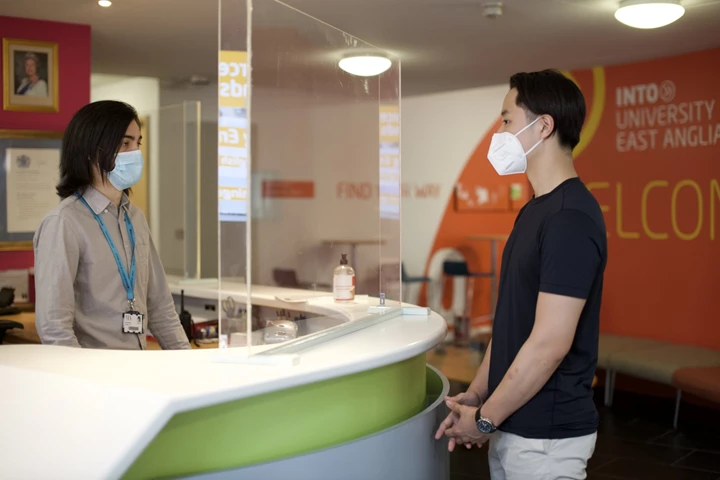The changing COVID-19 situation in the United Kingdom has made one thing clear—it is essential for those whom students have entrusted with their education and safety to lead with science and care. Across INTO’s U.K. centres this autumn, student services teams have developed international students’ arrival and study on campus into a science, implementing stringent measures to ensure their safety and success.
Pre-arrival snapshots: Communicating the situation on campus
Because the pandemic has transformed international travel, it was important that centres give a comprehensive snapshot of travel requirements and the situation on campus in advance of students’ arrival.
“Our usual confirmation communication contained additional information regarding pre-arrival guidance, links to government websites, what to expect on arrival to the U.K., and an outline of what COVID-19 safety measures would be in place on campus and in the accommodation,” Sabra Gardner, accommodation officer at INTO University of Exeter, explained.
In addition, videos that previewed life in accommodation during COVID-19 were shared across partner universities’ virtual learning environments (VLEs), and students were provided with information on self-quarantine and new processes to obtain important documents such as BRP campus cards, Bank letters, and GP registration.
Secure self-isolation: A safe start to the term
A safe start to the term hinged on students’ 14-day self-isolation. Every centre tracked students who needed to quarantine through a detailed arrivals report.
“Students were contacted once in the U.K. to be reminded of the quarantine requirements,” Sion Jones, head of student services at INTO Manchester, explained. Jones’s team made a series of one-on-one arrival welfare calls to introduce themselves to quarantining students and answer questions.
In all centres, students quarantined in single-occupancy rooms. They did not share any facilities with other students, guaranteeing a secure a quarantine process.
Keen to make the two weeks pass easily, INTO centres provided students with care packages full of sanitising supplies, snacks, and comfort items. At INTO Newcastle University, packages consisted of a reusable facemask, a thermometer, a face shield, and hand sanitizer, while packages at INTO Queen’s University, Belfast included bedding and kitchen supplies.
Without leaving their rooms, students also had access to a campus’s worth of services every day they self-isolated, including pre-arranged, contactless meal delivery at regular intervals, on-demand, contactless grocery and meal delivery, and a 24/7 emergency hotline.
Welcome Week: A window on a new world
Most students began the term remotely from their home countries or self-quarantining on campus, so many centres adapted the in-person sessions typical of Welcome Week to an online format.
At INTO Queen’s, this meant daily Q&A sessions in which staff fielded student queries ranging from opening bank accounts to Belfast’s best restaurants in real time. “We had a lot of students logging on for these,” Aine McComb, head of student services at INTO Queen’s, shared.
Live programming also offered students an opportunity to learn more about the culture of their new communities. “We had traditional Irish music and dancing that we were able to stream via [Microsoft] Teams to all students,” McComb added.
Face-to-face learning: Testing the science of student safety
Following the self-isolation period, student services teams’ science of student safety faced its ultimate test: face-to-face learning. All centres have taken a holistic approach to COVID-19 security, reconfiguring their day-to-day operations and academic spaces to protect students and staff.
INTO Newcastle has exemplified this approach. Gareth McKay, head of student services and accommodation at INTO Newcastle, and his team “require everyone to take their temperature every day before coming into the INTO Newcastle University buildings.” Daily temperature checks are reinforced by enhanced cleanings and treatments of Zoono Antimicrobial spray, which has been applied to every surface of the academic building and door handles and lift buttons in accommodation. Zoono “kills coronavirus on all surfaces for 30 days, and we are reapplying it every 28 days to ensure every surface is protected,” McKay emphasized.
The INTO Newcastle Centre operates at 25% occupancy, with plexi-glass screens at reception, reduced class sizes, a one-way system, and timetables that ensure students leave class at staggered intervals and minimize contact in public spaces.
Should it become necessary, INTO centres record information to make contact tracing instantaneous, and seamless. INTO Newcastle “tracks… QR codes on every door [to rooms] where people spend more than 15 minutes, and everyone is required to scan into a room,” McKay explained. As a preventative measure, the INTO Newcastle team will also have an onsite testing facility as of 16 October.
Likewise, Simon Duckworth, head of student services at INTO University of East Anglia (INTO UEA), explained that “students are allocated in accommodation by programme to ensure household/class bubbles,” preempting possible spread of infection.
A ‘new norm’: Students take COVID-19 measures in their stride
Whilst students and parents are understandably concerned about study abroad during the pandemic, INTO centres have gone beyond National Health Service guidance to keep students safe. Students, in turn, are taking COVID-19 measures in their stride.
“Students are more resilient than we give them credit for,” Jones remarked. “Many have taken to the new norm as water off a duck’s back.”
Students have also come together in these unprecedented times. Melissa Cadby, head of student services at INTO University of Stirling, noted, “The students have developed their own support group—checking on their classmates in 14-day self-isolation – and they have developed a clear bond in this unusual situation.”
It is a testament to students’ ambition, and it is the reason INTO staff safeguard student health with an attention to detail that can only be described as scientific.
